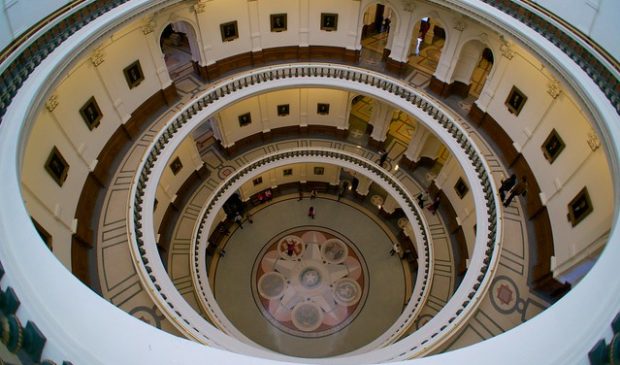Council strongly opposes property tax bills
Thursday, April 11, 2019 by
Jo Clifton As Speaker of the Texas House Dennis Bonnen calls the chamber to order today, Austin’s City Council will begin working its way through its regular agenda. That agenda includes a resolution adamantly rejecting House Bill 2, the property tax bill that proposes to lower the property tax revenue cap from its current 8 percent to 2.5 percent for cities and counties.
Only tax revenue generated by new properties would be exempt from the 2.5 percent cap. If a city or county approved a budget raising city taxes by more than 2.5 percent on previously taxed properties, it would automatically trigger an election on the tax hike. Under current law, citizens must petition for an election if a taxing jurisdiction goes beyond the 8 percent cap.
Mayor Pro Tem Delia Garza and Council members Jimmy Flannigan, Ann Kitchen and Greg Casar are holding a press conference before the Council meeting to discuss the resolution, which states that if the 2.5 percent revenue cap is enacted, the city of Austin “will face a $51.7 million deficit in three years.” This is no secret to anyone who listens to the city’s budget presentations and Council has already directed its lobbyists to oppose the measure.
According to the resolution, the projected deficit “is the equivalent of 612 firefighters, 549 police officers, or more than 50 percent of the entire operating budget for Austin Parks and Recreation.”
Mayor Steve Adler, who has been quite vocal in his opposition to HB 2 and its Senate counterpart, SB 2, is a co-sponsor on the resolution. He has suggested that the cap might be acceptable if public safety expenditures were excluded from the calculations, since nearly 70 percent of the city’s general fund is spent on police, fire and EMS services.
According to the resolution, “the 2.5 percent revenue cap proposed by House Bill 2 and Senate Bill 2 represents an impending crisis by limiting the city’s ability to provide for public safety and other essential services to its residents; and it is essential that any revenue cap measure passed by the Texas Legislature not restrict the city’s ability to protect public safety and provide needed city services.”
The resolution places blame for higher property taxes on the state because of “overreliance on local property taxes to fund public schools.” Although the Senate bill would restrict school districts from raising property taxes by more than 2.5 percent, the House bill excludes school districts.
Cities and counties across the state, as well as the Texas Municipal League, have been clear about their opposition to the 2.5 percent cap.
Harris County Judge Lina Hidalgo wrote in a letter to Bettencourt, “If the state passes an arbitrary cap on our growth, they will effectively place an arbitrary cap on the roads we can build and maintain and the law enforcement resources we can fund.”
One analysis found on a state of Texas website shows that overall, Texas counties would lose $249,702,000 and Texas cities would lose $280,391,000 in 2021, the year the change would go into effect.
According to the Texas Municipal League, Texas cities are among the fastest growing in the country, with many cities experiencing a population growth of more than 10 percent since 2010. “The state demographer recently estimated the state’s population will double by 2050. In other words, more than 25 million more people will be living in Texas in 35 years, and cities will experience the lion’s share of that population growth. Given this reality, now is the exact wrong time for the state to further limit cities’ financial flexibility when it comes to providing essential transportation infrastructure and public safety protections (among other things) to a rapidly growing population.”
Cities and counties would continue to use the 8 percent cap for the upcoming budget year, and knowing that they will face smaller revenue caps in future years will encourage local officials to adopt close to the current rollback rate in order to generate sufficient reserves for the future.
On Wednesday, Gov. Greg Abbott, Lt. Gov. Dan Patrick and the speaker proposed raising the state’s sales tax by one cent. It is not clear how this change, which must be approved by voters, would benefit cities and counties.
Photo by Paul Hudson made available through a Creative Commons license.
The Austin Monitor’s work is made possible by donations from the community. Though our reporting covers donors from time to time, we are careful to keep business and editorial efforts separate while maintaining transparency. A complete list of donors is available here, and our code of ethics is explained here.
You're a community leader
And we’re honored you look to us for serious, in-depth news. You know a strong community needs local and dedicated watchdog reporting. We’re here for you and that won’t change. Now will you take the powerful next step and support our nonprofit news organization?




